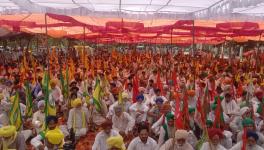Why Punjab Needs Cooperative Farming at Panchayat Level
On December 5, 2022, Punjab Agriculture Minister Kuldeep Singh Dhaliwal said in a discussion on 'Agricultural Development Model of Punjab - Some Policy Issues' held by the Punjab State Farmers and Agricultural Workers Commission that a New Agricultural Policy of the state will be prepared by the beginning of the financial year 2223-24. According to him, the geographical situation of the state, soil health, and water availability will be the basis of the New Agricultural Policy.
Here, it is important to know that in the last decade, two drafts were prepared regarding formulating Punjab's agricultural policy, but they did not get anywhere. In 2013 under Dr GS Kalkat and in 2018 under Ajayvir Jakhar, two different drafts were prepared related to the state's agriculture policy. Still, the governments of that time did not discuss these drafts and prepare an appropriate agricultural policy based on them.
The COVID-19 pandemic has made this fact clear that bread is most important for human life. Humans can survive without cars, bungalows, aeroplane travel, phones and other luxuries, but life is impossible without bread. The agricultural sector can only provide bread. Realising the importance of bread for human life, all the countries of the world should prepare and implement such agricultural policies, which would be helpful for sustainable agriculture.
Many aspects need to be considered regarding formulating the New Agricultural Policy of Punjab. These considerations include ensuring a minimum income level for agricultural-dependent farmers, agricultural labourers, and rural artisans, maintaining groundwater levels, improving soil health, protecting against environmental pollution and ensuring the supply of clean drinking water. Some issues need to be considered regarding the success of the above aspects.
Data on farmers and agricultural labourers in Punjab is unavailable from sources other than the 2011 census. Statistics of rural artisans in Punjab are not available from any source. The number of small rural artisans in Punjab is continuously decreasing, for which the use of machinery in the agricultural sector and the use of plastic in the general life of the people are mainly responsible. According to the 2011 census, there are 19.35 lakh farmers and 15.88 lakh agricultural labourers in Punjab.
Leaving aside the questions raised from time to time regarding the number of farmers and agricultural labourers and the non-availability of data on rural artisans, it is necessary to ensure a minimum level of income for the workers of these three agricultural classes through which they can fulfil their basic needs of life like food, clothing, housing, education, health care, clean environment, and social security in a respectable manner.
Due to the hard work of Punjab's farmers, agricultural labourers, and rural artisans and the excessive use of the state's natural resources, the country overcame the huge shortage of food grains during the 1960s. Small in size (1.54%), the state of Punjab has made an excellent contribution to the Central Pool of Food Grains for a long time. In 1979-80 this contribution was 67.7% in respect of wheat and rice.
Although this contribution of Punjab has decreased as a result of the fact that the central government has been giving priority to the development of the agricultural sector of other states, even during 2020-21, this contribution is 25.9 per cent. One aspect that needs attention in this regard is that when natural calamities hit the country's agricultural sector, Punjab's contribution to the country's Central Pool of Food Grains increases. This is particularly true in the case of drought.
Some issues should be considered regarding the classes dependent on the agricultural sector of Punjab for their livelihood. Farmer organisations of Punjab, including the other states of the country and some political parties, have been demanding and struggling with fixing, giving legal guarantees and purchasing agricultural commodities based on Swaminathan's recommendations. Although the Central government fixes minimum support prices for 23 agricultural commodities, some of these commodities are being procured from only a few states.
As per Swaminathan's recommendation, ensuring 50% profit on total agricultural production costs would make agriculture a profitable business for farmers. By doing this, as the farm size increases, so will the total profit of the farmers. Even if this happens, there will not be any significant increase in the income of marginal and small farmers and agricultural labourers and rural artisans. Marginal and small farmers have minimal surplus to sell in the market. Due to the landlessness of a considerable number of agricultural labourers and rural artisans, increasing the minimum support prices of agricultural commodities will not directly benefit these classes as these classes have nothing else to sell in the market except their labour.
The ever-increasing use of machinery and herbicides in the agricultural sector has drastically reduced the days of employment for agricultural labourers and rural artisans. Despite these facts, the fixation of minimum support prices of agricultural commodities based on Swaminanthan's recommendation and their legal guarantee is of utmost importance for the agriculture sector.
The Central government mainly fixes the minimum support prices of agricultural commodities. The procurement agencies of the central and state governments purchase some agricultural commodities for the central government at these prices. Although this year, the Punjab government has purchased some quantities of Moong (green gram) at its minimum support price, the purchase of today's main crops, wheat and paddy, is beyond the state government's budget. Where will the finance for it come from if the Punjab government procures wheat and paddy produced in Punjab itself? In this regard, the state government will face serious problems with the storage of these commodities. For the inter-state movement of these agricultural commodities, approval of the central government will be required. The state government of Punjab can only play a complementary role in this regard by increasing its financial resources.
The Central government formulated and implemented export and import policies for agricultural commodities, which affect the income of the agricultural sector-dependent sections. The state governments do not have any rights in this regard. The central government controls most of the institutional sources to meet the financing requirements for agricultural production. The state government cannot make any major contribution in this regard. The central government has the right to fix the prices of the main inputs required for agricultural production, like diesel, chemical fertilisers etc., or to transfer them to the unregulated market, due to which the state government cannot play any important role in this regard.
The agricultural diversification needed to improve soil health, maintain groundwater levels, and protect the environment from pollution in the state depends primarily on minimum support prices and assured procurement of agricultural commodities by the central government. The state government can make a positive contribution regarding land use. By making policies related to chemical fertilisers, pesticides, fungicides, herbicides and other chemicals used in the agricultural sector, the state government can contribute positively to improving soil health, protecting the environment from pollution, and ensuring access to clean drinking water.
A commendable contribution the state government can make concerning land use is promoting cooperative farming. In the state, the AAP government has brought and is bringing a lot of land under the control of panchayats by removing illegal encroachment from panchayat and shamlat lands. The main purpose of utilisation of income derived from panchayat and shamlat lands is to carry out public welfare works. Dalits have a legal right to cultivate one-third of the panchayat lands, but even for this, they have to pay considerably less than the market rent.
A study by Professor Bina Aggarwal has revealed that there are more than 68,000 cooperative agricultural groups of landless women in the state of Kerala. These groups do farming by taking land on contract. The production of these groups is 1.9 times, and the net economic profit is five times that of ordinary farmers. Cooperative farming helps in reducing production costs and increasing income. As far as Punjab is concerned, cooperative farming should be started from panchayat lands on a priority basis. It should be ensured that one-third of the Panchayat lands are given to dalits, one-third to women and one-third to landless farmers for cooperative farming without taking any rent so that the socio-economic conditions of these sections who depend on agriculture for their livelihood can be improved. Financial and other concessions are also to be given to cooperative farming groups.
The author is a former professor at the Department of Economics, Punjabi University, Patiala. The views are personal.
Get the latest reports & analysis with people's perspective on Protests, movements & deep analytical videos, discussions of the current affairs in your Telegram app. Subscribe to NewsClick's Telegram channel & get Real-Time updates on stories, as they get published on our website.
























